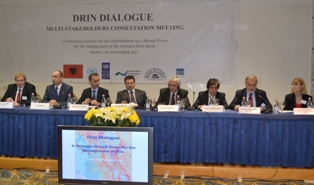 Tirana
Tirana On 25 November 2011 in Tirana the five Drin River Riparians signed a Memorandum of Understanding on a Shared Strategic Vision for the Sustainable Management of the Drin River Basin to protect the shared water resources for about 1.5 million people relying on the water resources of the basin for drinking water, agriculture, fisheries, industry and hydropower. Recent floods, in particular, have highlighted the need for such closer transboundary cooperation.
Fatmir Mediu, Minister of Environment, Forests and Water Administration, Albania; Abdilaqim Ademi, Minister of Environment and Physical Planning, The former Yugoslavia Republic of Macedonia; Ilir Mirena, Deputy Minister of Environment and Spatial Planning, Kosovo (United Nations administered region, Security Council resolution 1244); Andreas Andreadakis, Special Secretary for Water, Ministry of Environment, Energy and Climate Change, Greece, and Velizar Vojinovic, Deputy Minister of Agricultural and Rural Devevelopment, Montenegro, signed the Memorandum, which represents a significant step forward in the development of transboundary cooperation in the Drin Basin.
The Drin Dialogue, which was set up to look into the many competing interests and challenges facing Riparians and which led to the signing of the Strategic Vision, was facilitated by the United Nations Economic Commission for Europe (UNECE) and the Global Water Partnership-Mediterranean.
Competing uses for the water resources of the basin need to be addressed. Hydropower is of particular importance, with major dams and associated power stations in the former Yugoslav Republic of Macedonia and in Albania, where hydropower accounts for more than 85 per cent of the total electricity supply. In addition, the basin faces a number of threats to its water quality, such as pollution from agriculture and discharges of untreated wastewater from cities. The exceptional biodiversity and endemic species of the Drin Basin are also under threat without improved and coordinated management of the ecosystem.
The Shared Strategic Vision identifies the challenges at the transboundary level and lays out the actions that need to be taken to address them, such as:
- Improving access to comprehensive data and adequate information
- Developing cooperation and measures to minimize flooding
- Improving management and appropriate disposal of solid wastes
- Decreasing pollution of nutrients and hazardous substances such as heavy metals and pesticides
- Minimizing the effects of the building of dams and other changes of the water system.
The Shared Strategic Vision includes specific objectives in the short, medium and long term and institutes the Drin Core Group with representation from all Riparians to manage its implementation.
The signing took place during a Multi-stakeholder Consultation Meeting of the Drin Dialogue, with the participation of representatives from the riparian countries: national, regional and local authorities, important economic sectors, water users associations, academia, the private sector and non-governmental organizations, as well representatives of international organizations and donor countries. Marco Keiner, Director of the UNECE Environment Division, and Mr. Michael Scoullos, Chairman, Global Water Partnership-Mediterranean, also participated in the ceremony. Marco Keiner said that UNECE stands ready to further support the Drin Dialogue process, i.e. the implementation of the signed shared vision.
Note to editors
The Drin Dialogue is a structured consultation process that aims to develop a shared vision among Riparians and stakeholders for the sustainable management of the Drin Basin. The Drin Dialogue is facilitated by UNECE and the Global Water Partnership-Mediterranean (GWP-Med) using the platform of the UNECE Convention on the Protection and Use of Transboundary Watercourses and International Lakes (Water Convention) and the Petersberg Phase II/Athens Declaration Process. It is part of Environment and Security Initiative (ENVSEC) work programme and is financially supported by the Swedish Environmental Protection Agency. The Drin Core Group, with representatives from all Riparians, has guided the process to establish the Shared Strategic Vision for the sustainable management of the basin.
The Drin Basin covers a geographical area that includes Albania, Greece, the former Yugoslav Republic of Macedonia, Kosovo (United Nations administered region, Security Council resolution 1244) and Montenegro. The Drin River is the connecting body of this water system, linking the lakes, wetlands, rivers and other aquatic habitats into a single ecosystem of major importance. The region is very rich in endemic species and exceptional in terms of biodiversity conservation, and so has great potential for the development of sustainable tourism.
The UNECE Water Convention is an important legal framework for transboundary water management in the pan-European region. The Drin Dialogue is part of its work programme. Currently, 37 countries and the European Union are Parties to the Convention. The former Yugoslav Republic of Macedonia and Montenegro are preparing for accession; Albania and Greece are already Parties.
The Global Water Partnership-Mediterranean (GWP-Med) is a platform bringing together competent organizations working on water issues in the Mediterranean region. Created in 2002, this non-governmental organization promotes and exchanges knowledge on integrated water resources management for the sustainable use of the region’s water resources. GWP-Med is the technical secretariat of the Petersberg Phase II/Athens Declaration Process for South-East Europe, a framework for the development of transboundary water cooperation in the region. For more information, see http://www.gwpmed.org.
Contact information:
Bo Libert
UNECE Regional Adviser on Environment
Tel.: +41 (0) 22 917 2396, +41 (0) 22 917 2396
Email: [email protected]